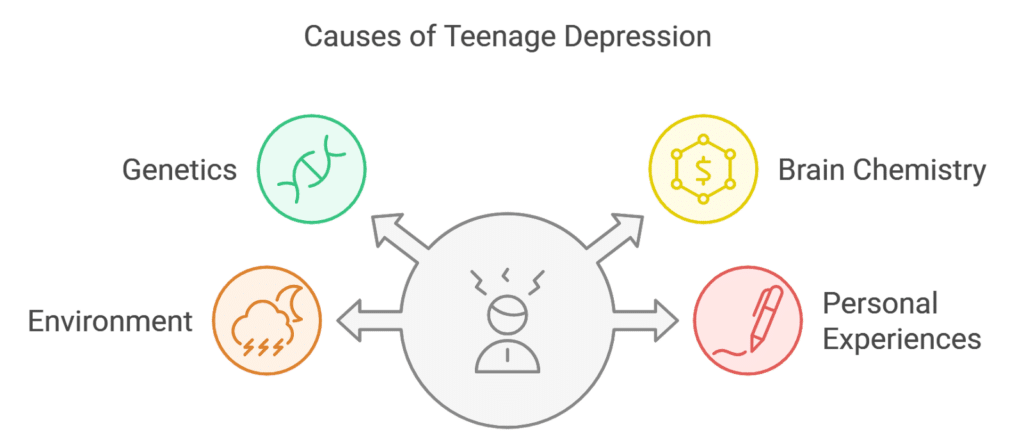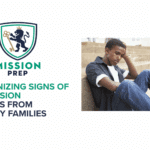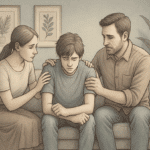Being a teenager is like riding a rollercoaster of emotions—thrilling yet unpredictable!
With school pressures, friendship dramas, and the whirlwind of growing up, it’s no wonder teens experience their fair share of ups and downs.
But what happens when those low points go beyond ordinary mood swings? They could be a sign of something more serious, like depression.
It’s vital for parents, siblings, and teens to recognize the signs early on. Let’s dive into what teenage depression really looks like, how it differs from adult depression, and why catching it early can make all the difference!
What is Teenage Depression?
Adolescent depression goes beyond feeling sad or moody for a few days. We all have our off days, but depression is constant, affecting how teens feel, think, and behave for weeks or even months. It can sneak up slowly and often resembles typical teenage behavior, making it tricky to identify.
Depression is more than just having a bad day; it’s a complex medical condition that impacts how our brains work. It disrupts the delicate balance of neurotransmitters like serotonin and dopamine—key players in regulating our mood.
When chemicals in the brain are out of balance, it can trigger ongoing feelings of sadness, fatigue, and a struggle to enjoy life. For many, especially teens, depression arises from a complex interaction of factors like genetics, brain chemistry, environment, and personal experiences.
Common Symptoms of Depression in Teenagers
Spotting depression in teenagers can be tricky, since it’s often as unique as they are. Some teens withdraw, while others may act out.
Here are some symptoms of clinical depression in teens to watch for:
- Persistent sadness or hopelessness: If your teen seems unusually down or detached for a prolonged period, this could indicate depression. They might appear numb or like they’ve lost interest in life.
- Irritability or anger: Depression doesn’t always manifest as sadness. Some teens show it through irritability, frequent anger, or frustration over minor things.
- Changes in behavior: Noticeable changes like withdrawing from family and friends, skipping school, or avoiding activities they used to enjoy can be signs of depression.
- Physical symptoms: Teens might not discuss their emotional struggles, but their bodies can reflect them. Look for constant fatigue, changes in sleep in eating patterns, or unexplained aches and pains.
- Lack of concentration: Difficulty focusing or making decisions is common. If your teen’s school work has started to slip, or they seem more forgetful, it could be a symptom of something more than stress.
Recognizing these signs is the first step toward getting your teen the help they need.
How is Teenage Depression Different from Adult Depression?
You might wonder how teenage depression differs from adult depression. While both experience it, teens and adults often show different symptoms due to hormonal differences and developmental stages.
Teens may express depression through anger or irritability, whereas adults often show sadness or withdrawal. Teens are still learning emotional expression, which can make their symptoms look like rebellious behavior rather than depression.
Teenagers also face unique stressors—peer pressure, academic expectations, and social dynamics—all while figuring out who they are.
With social media constantly in the background, teens often compare themselves to others, worsening feelings of inadequacy and isolation. That’s why it’s vital for parents and families to pay close attention to their teens’ emotional and behavioral changes, even if they chalk it up to “just being a teenager.”
Why Recognizing the Signs Early is Key
Recognizing the signs of depression early is crucial. Depression can affect every aspect of a teen’s life—school performance, friendships, and physical health. If left untreated, it can lead to more serious mental health concerns, such as substance abuse or suicidal thoughts. But there’s hope—early intervention makes a significant difference.
A strong support system at home is vital. Parents should keep communication open, encouraging teens to share their feelings without fear of judgment. The earlier families acknowledge the signs of depression and take action, the sooner teens can begin to heal.
What to Do if You Suspect Your Teen is Depressed
If you’ve noticed these symptoms in your teen, what should you do? Start by opening the lines of communication. Approach your teen with empathy, letting them know you’re concerned because you care. Avoid coming off as accusatory or overly worried, which might cause them to shut down.
Consider seeking professional help. A mental health professional, like us at Mission Prep, can assess your teen’s situation and provide the necessary support. Whether through therapy, counseling, or family treatment programs, help is available. Depression is not something to tackle alone, and reaching out for support shows strength, not weakness.
Finally, encourage small, manageable changes at home. Help your teen stick to a routine, stay physically active, and spend time outside. Simple activities like walking or getting sunlight can help, though they’re not substitutes for professional care but can complement treatment.
How Mission Prep Healthcare Can Help
At Mission Prep, we’re dedicated to providing tailored and comprehensive treatment for adolescent depression. Our journey begins with a detailed assessment, diving deep into our clients’ experiences, family history, and dynamics. We also conduct the Adverse Childhood Experiences (ACEs) assessment to identify any past trauma and to understand if family members have faced mental health challenges.
We tackle depression by exploring how it influences everyday life—your child’s sleep patterns, diet, energy levels, and thoughts. It’s not just about feeling sad; depression can disrupt your sleep, push you into isolation, and even manifest as headaches or stomach aches.
To build a strong foundation for recovery, we help clients create healthy habits. We understand that depression can make teens feel unmotivated, so we approach this gradually. We utilize early light exposure and fresh air—both effective in managing depression. Many of our sessions are outdoors, where sunlight and fresh air can improve mood and well-being.
If you’re concerned about your teen, know you’re not alone. Mission Prep Healthcare is here to support your family every step of the way. We believe in creating sustainable change that helps both teens and families thrive. Reach out to us today, and let’s work together to give your teen the fresh start they deserve.





















